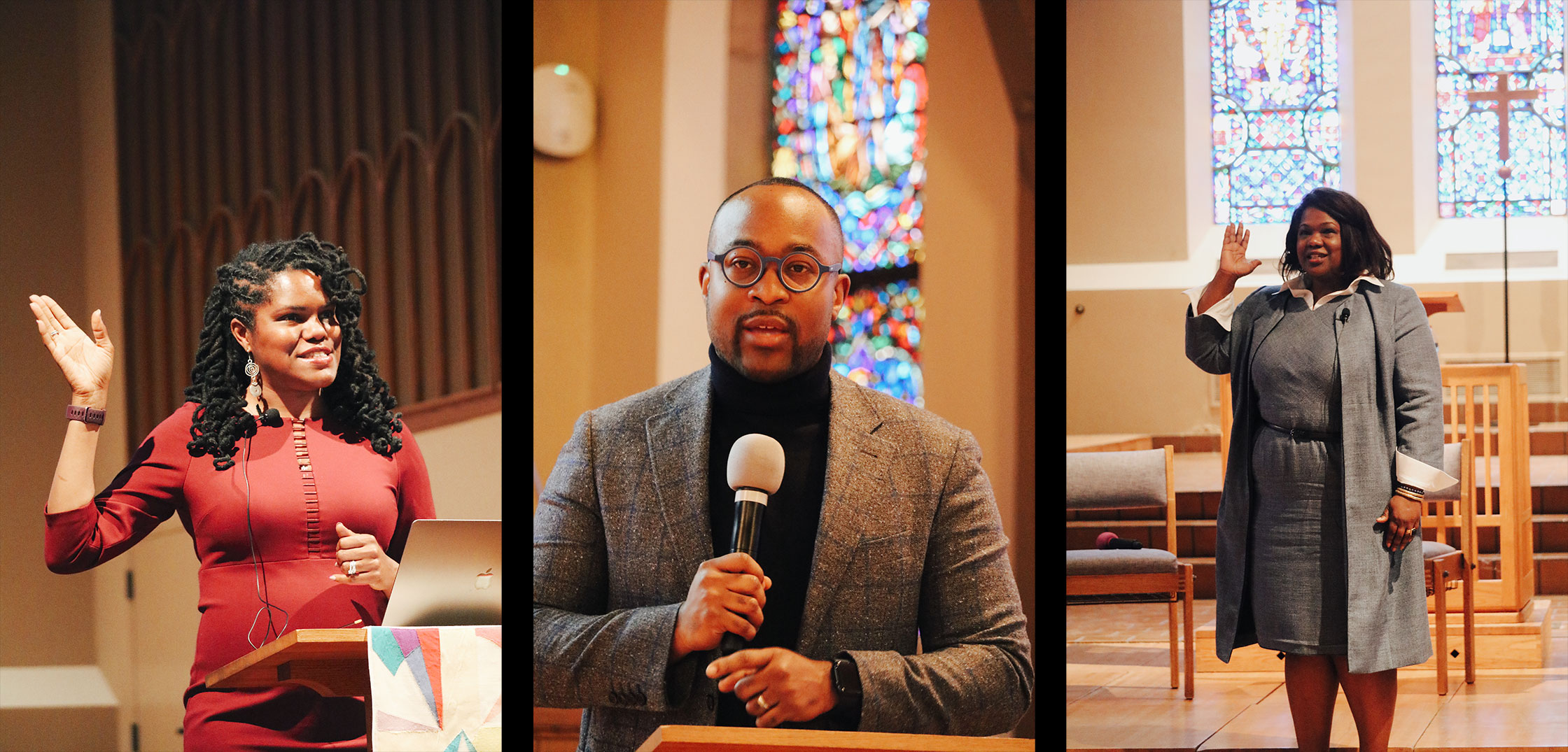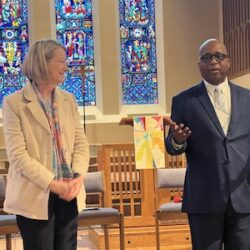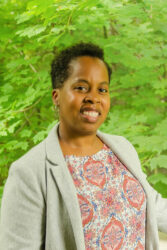Philanthropy and the Black Church: A Necessary Collaborative
Philanthropy and the Black Church: A Necessary Collaborative
by Reggie Blount and Elizabeth Lynn
In late April of this year, the Center for the Church and the Black Experience at Garrett-Evangelical Theological Seminary and Lake Institute on Faith & Giving co-hosted a special Symposium on Philanthropy and the Black Church on Garrett’s campus in Evanston, IL. The symposium brought together 70 key leaders in philanthropy and faith to start a conversation about building a “necessary collaborative” between philanthropy and Black religious institutions, in a time when both philanthropy and the Black church have good reason to look to one another in partnership—and yet struggle to do so. [See our full report on the symposium here.]
Interestingly, the conversation was not a new one.
Looking Back
Nearly fifty years ago, in the last quarter of the twentieth century, organized philanthropy sought a new relationship with Black churches and denominations. Work on this relationship had started in the 1970s, led by Lilly Endowment, Inc. and joined in the 1980s by the Ford Foundation. During those decades, both foundations developed grantmaking programs in support of Black churches. As part of their programs Lilly and Ford also supported research and scholarship that powerfully documented the breadth and depth of Black church community service and made plain that Black churches are themselves philanthropic organizations indeed, they have long been the Black community’s central, indigenous philanthropic institution.
Strengthened by this narrative shift and compelling data, the project gained momentum in the 1990s, as the Council on Foundations, led by Council president James Joseph, created a “national office” to support and encourage wider foundation engagement with Black religious organizations. The Council’s national office provided highly popular education programs at network meetings; published several large volumes of papers and proceedings; cultivated strategic partnerships; encouraged collaboration against the philanthropic grain; and raised funds to support the spread of the work. In response, small and large foundations from Massachusetts to Florida, Michigan to Colorado took up the call, launching highly innovative initiatives to encourage philanthropic investment in and by Black churches in America.
All of this is beautifully described in Why the Black Church?, a retrospective on the project written by Dr. Robert Franklin Jr. and published in 2005 by the Southern Education Foundation.
As the term ‘retrospective’ suggests, however, by 2005 the project was past tense. Leadership changed. Funders’ priorities changed. In 1995 James Joseph was appointed United States Ambassador to South Africa, and in 1997 the Council closed its office on Philanthropy and the Black Church. A few programs continued. But the sense of a common project, of a ‘necessary collaborative,’ disappeared, and with it any momentum. In her foreword to Franklin’s report, Southern Education Foundation president Lynn Huntley summarized the situation bluntly.
Unfortunately, the project did not have either the resources or longevity to prompt a private philanthropic response commensurate with the power, potential and importance of Black churches as leadership and change agents for underserved communities.
Where Are We Now?
So, this is not a new conversation. Yet, it is definitely a necessary conversation to have again today. The COVID pandemic shed light on the various other epidemics that have plagued under-served and under-resourced communities made up of Black and Brown people. The George Floyd, Breonna Taylor and other senseless murders shined a bright light on the reality of historic racial inequity and injustice across our society.
In the field of philanthropy, that reckoning has spurred key donors and foundations to think about how they can partner more intentionally with Black-led organizations—and more specifically with Black churches as anchor institutions in Black communities. Yet, what has also become clear is that there is a wide gulf of knowledge, understanding, and existing partnership between philanthropic and Black church organizations today. There are funders who say they want to invest in Black churches as anchor institutions, but they do not know where to start.
And then there is the question our friend Devin Murphy has posed to us, that we find ourselves going back to again and again: Who are our Black church leaders looking to from a place of trust to help them? (Read the report from the 2023 Symposium on Philanthropy and the Black Church.)
What’s Next and What You Can Do
Our sense is that pathways to trust-building began, again, in the imaginative, innovative, possibility-posing conversations that took place during the symposium of April 2023. We will share a full report on that convening in the coming month, even as we begin to plan a follow-up symposium, to be held in Indianapolis in Spring 2024. But, in brief, here are three steps that the 2023 symposium participants identified toward building a necessary collaborative between philanthropy and Black religious organizations, steps that funders and churches can start to take today:
- Seek opportunities for mutual introduction. The symposium clearly highlighted a wide gulf of knowledge and understanding between philanthropic and Black church organizations. There is an opportunity for philanthropy and Black churches to learn about one another, gain cultural competency, and discover mutual mission alignment.
- Look again. Philanthropic organizations can shift mindset and perception to see Black churches who have served their communities for a significant period of time as anchor institutions, similar to hospitals, schools and community organizations like United Way. It is an opportunity for Black churches to more fully claim this identity as well, and to embrace the transformative value they provide to the communities they serve, as Quintin Primo argues compellingly in a column just out this week.
- Invest in people, not just programs. Philanthropy should consider ways to invest in the capacity building and leadership development of congregational leaders that would enable them to better scale the transformative impact many are striving to make in the communities they serve.
If you would like to receive our report, attend our 2024 symposium, or simply learn more about this collaborative effort to re-connect philanthropy and Black religious communities, please click here to sign up for a special Philanthropy and Black Church mailing list.
We look forward to hearing from you and to building, together, a new conversation—and necessary collaborative—between philanthropy and the Black church.
Dr. Reggie Blount serves on the faculty of Garrett-Evangelical Theological Seminary as Associate Professor of Formation, Leadership and Culture teaching in the areas of Christian Education, Youth and Young Adult Ministry and Congregational Leadership. He serves further as Co-Executive Director of the Children Defense Fund Garrett-Evanston Freedom School Program, Program Director of the Garrett-Evangelical Young Adult Initiative, and Advisor for the Doctor of Ministry in Strategic Leadership in Black Congregations. Dr. Blount currently serves as pastor of Arnett Chapel A.M.E. Church in the Morgan Park community of Chicago, IL. He is also the co-founder and executive director of the Oikos Institute for Social Impact which exists to create mutually supportive ecosystems that strengthen the Faith, Intellectual, Social and Human Capital of faith communities dedicated to expanding their social impact and transformational work in the under-resourced communities they serve.
Dr. Elizabeth Lynn has founded and led several programs designed to expand moral imagination for civic leadership, including the Center for Civic Reflection. Through her writings and creative leadership she has contributed to contemporary understandings of philanthropy and the humanities in American life. Elizabeth currently directs Shifting Ground, a Lake Institute initiative focused on deepening conversation about the changing landscape of faith, philanthropy, and community.
Questions for Reflection
-
- Why do you think that organized philanthropy and Black churches have trouble connecting? What are the obstacles and opportunities you see?
- Of the three steps listed at the end (seek opportunities for mutual introduction; look again at the role of Black churches; and invest in people, not just programs), which feels most pressing to you? How might your own organization be part of this “necessary collaborative?”
Expanded Perspective
As one of the organizers of the 2023 Symposium on Philanthropy and the Black Church, I had the opportunity to listen to the conversation. I also got to hear from attendees after the fact, through their thoughtful evaluations, and learned not only why they chose to attend the symposium, but what kept them engaged throughout, and how they’d like to continue the conversation.
When asked “Why did you choose to attend the symposium?” one attendee responded:
To gain knowledge on the subject and to see what I, as a funder, can do to assist.
The Symposium on Philanthropy and the Black Church was designed to be a continuation of a not-so-new conversation, begun by leading philanthropic institutions in the 1970s, that disappeared right around the turn of this century.
And yet, the need for the kind of conversation that started all those decades ago apparently never disappeared, as indicated by a response from another attendee to the question, “What engaged you most in these conversations?:”
The opportunities that exist to connect both. Getting to learn about the language and culture of organized philanthropy. Hearing both sides theorize about why the two streams rarely meet. And best of all, the people.
The comment above reflects two themes that emerged throughout the symposium: a need to learn and a hunger to connect. One connection happened during lunch on the first day when two people, who had heard of one another but never met, were introduced. That introduction felt like the beginning of a relationship that will undoubtedly continue.
Finally, one respondent answered the question “What questions are you now asking about philanthropy and/or the Black church?” with the following:
I am curious how philanthropy can draw more deeply on history and tradition, and how the Black church might more effectively enter into conversations about innovation and change.
Through a budding partnership between the Center for the Church and the Black Experience at Garrett and Lake Institute on Faith & Giving, the conversation that started all those years ago will hopefully deepen and extend the “necessary collaborative” between organized philanthropic institutions and Black religious institutions for years to come. This ongoing conversation can benefit not only the collaborators themselves but the larger communities they seek to engage with for greater impact.
Celebrating Black Philanthropy Month
 The Indiana University Lilly Family School of Philanthropy is proud to recognize the efforts of Black Philanthropy Month and the initiative’s work to showcase the powerful impact of Black philanthropists, scholars, practitioners, and champions.
The Indiana University Lilly Family School of Philanthropy is proud to recognize the efforts of Black Philanthropy Month and the initiative’s work to showcase the powerful impact of Black philanthropists, scholars, practitioners, and champions.
It aligns directly with the school’s own values to make our field more equitable and just. To that end, we have gathered a variety of resources to aid in the discussion, advocacy, and future of Black philanthropy.
Gospel of Giving
 Madam C. J. Walker’s Gospel of Giving, by Tyrone McKinley Freeman, tells the story of the origins and evolution of one woman’s generosity, but it was (and is) not her story alone. It is also the story of a people and how their generosity helped them navigate and ultimately overcome powerful and externally imposed constraints. This book provides a window into the evolution of black women’s philanthropy during the critical turn-of-the-century period, which sets the stage for the coming civil-rights movement and provides the historical grounding for giving by African Americans today.
Madam C. J. Walker’s Gospel of Giving, by Tyrone McKinley Freeman, tells the story of the origins and evolution of one woman’s generosity, but it was (and is) not her story alone. It is also the story of a people and how their generosity helped them navigate and ultimately overcome powerful and externally imposed constraints. This book provides a window into the evolution of black women’s philanthropy during the critical turn-of-the-century period, which sets the stage for the coming civil-rights movement and provides the historical grounding for giving by African Americans today.
Subscribe
Insights is a bi-weekly e-newsletter for the religious community and fundraisers of faith-based organizations that provides:
- Reflections on important developments in the field of faith and giving
- Recommended books, studies and articles
- Upcoming Lake Institute events



